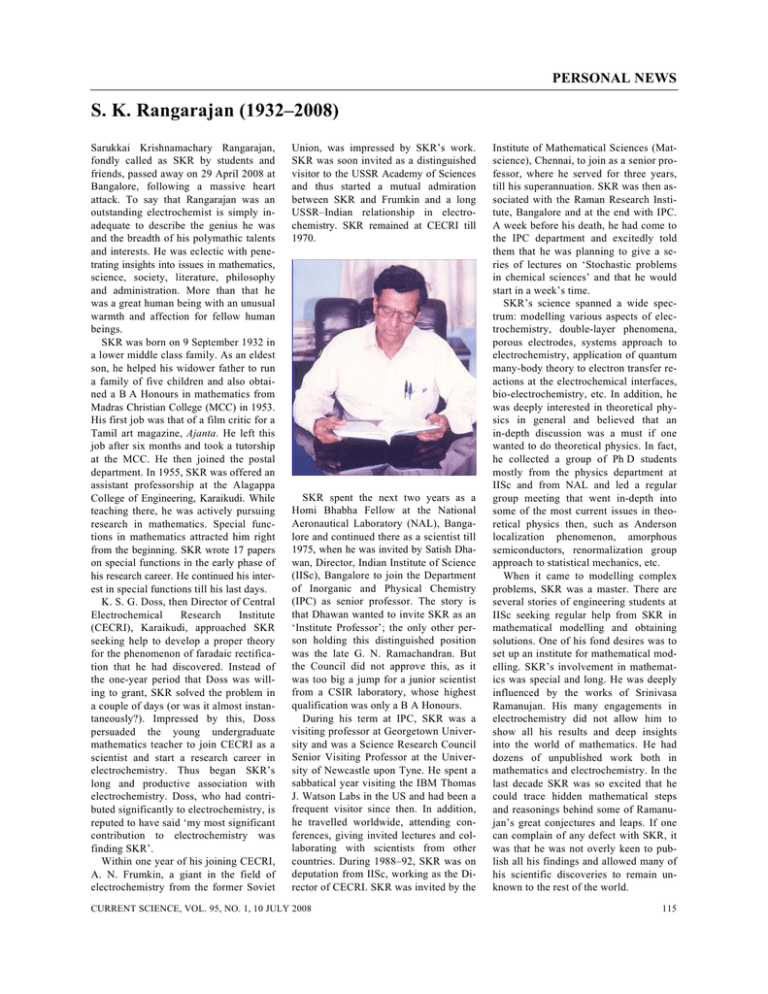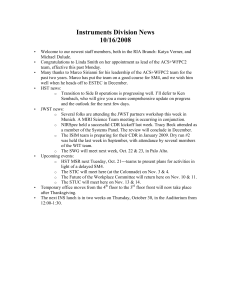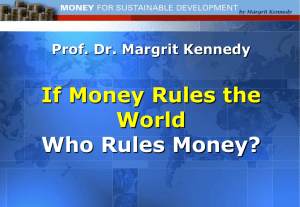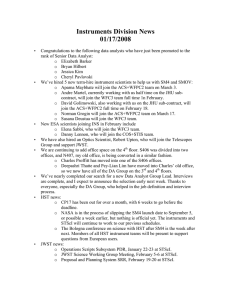S. K. Rangarajan (1932–2008) PERSONAL NEWS
advertisement

PERSONAL NEWS S. K. Rangarajan (1932–2008) Sarukkai Krishnamachary Rangarajan, fondly called as SKR by students and friends, passed away on 29 April 2008 at Bangalore, following a massive heart attack. To say that Rangarajan was an outstanding electrochemist is simply inadequate to describe the genius he was and the breadth of his polymathic talents and interests. He was eclectic with penetrating insights into issues in mathematics, science, society, literature, philosophy and administration. More than that he was a great human being with an unusual warmth and affection for fellow human beings. SKR was born on 9 September 1932 in a lower middle class family. As an eldest son, he helped his widower father to run a family of five children and also obtained a B A Honours in mathematics from Madras Christian College (MCC) in 1953. His first job was that of a film critic for a Tamil art magazine, Ajanta. He left this job after six months and took a tutorship at the MCC. He then joined the postal department. In 1955, SKR was offered an assistant professorship at the Alagappa College of Engineering, Karaikudi. While teaching there, he was actively pursuing research in mathematics. Special functions in mathematics attracted him right from the beginning. SKR wrote 17 papers on special functions in the early phase of his research career. He continued his interest in special functions till his last days. K. S. G. Doss, then Director of Central Electrochemical Research Institute (CECRI), Karaikudi, approached SKR seeking help to develop a proper theory for the phenomenon of faradaic rectification that he had discovered. Instead of the one-year period that Doss was willing to grant, SKR solved the problem in a couple of days (or was it almost instantaneously?). Impressed by this, Doss persuaded the young undergraduate mathematics teacher to join CECRI as a scientist and start a research career in electrochemistry. Thus began SKR’s long and productive association with electrochemistry. Doss, who had contributed significantly to electrochemistry, is reputed to have said ‘my most significant contribution to electrochemistry was finding SKR’. Within one year of his joining CECRI, A. N. Frumkin, a giant in the field of electrochemistry from the former Soviet Union, was impressed by SKR’s work. SKR was soon invited as a distinguished visitor to the USSR Academy of Sciences and thus started a mutual admiration between SKR and Frumkin and a long USSR–Indian relationship in electrochemistry. SKR remained at CECRI till 1970. SKR spent the next two years as a Homi Bhabha Fellow at the National Aeronautical Laboratory (NAL), Bangalore and continued there as a scientist till 1975, when he was invited by Satish Dhawan, Director, Indian Institute of Science (IISc), Bangalore to join the Department of Inorganic and Physical Chemistry (IPC) as senior professor. The story is that Dhawan wanted to invite SKR as an ‘Institute Professor’; the only other person holding this distinguished position was the late G. N. Ramachandran. But the Council did not approve this, as it was too big a jump for a junior scientist from a CSIR laboratory, whose highest qualification was only a B A Honours. During his term at IPC, SKR was a visiting professor at Georgetown University and was a Science Research Council Senior Visiting Professor at the University of Newcastle upon Tyne. He spent a sabbatical year visiting the IBM Thomas J. Watson Labs in the US and had been a frequent visitor since then. In addition, he travelled worldwide, attending conferences, giving invited lectures and collaborating with scientists from other countries. During 1988–92, SKR was on deputation from IISc, working as the Director of CECRI. SKR was invited by the CURRENT SCIENCE, VOL. 95, NO. 1, 10 JULY 2008 Institute of Mathematical Sciences (Matscience), Chennai, to join as a senior professor, where he served for three years, till his superannuation. SKR was then associated with the Raman Research Institute, Bangalore and at the end with IPC. A week before his death, he had come to the IPC department and excitedly told them that he was planning to give a series of lectures on ‘Stochastic problems in chemical sciences’ and that he would start in a week’s time. SKR’s science spanned a wide spectrum: modelling various aspects of electrochemistry, double-layer phenomena, porous electrodes, systems approach to electrochemistry, application of quantum many-body theory to electron transfer reactions at the electrochemical interfaces, bio-electrochemistry, etc. In addition, he was deeply interested in theoretical physics in general and believed that an in-depth discussion was a must if one wanted to do theoretical physics. In fact, he collected a group of Ph D students mostly from the physics department at IISc and from NAL and led a regular group meeting that went in-depth into some of the most current issues in theoretical physics then, such as Anderson localization phenomenon, amorphous semiconductors, renormalization group approach to statistical mechanics, etc. When it came to modelling complex problems, SKR was a master. There are several stories of engineering students at IISc seeking regular help from SKR in mathematical modelling and obtaining solutions. One of his fond desires was to set up an institute for mathematical modelling. SKR’s involvement in mathematics was special and long. He was deeply influenced by the works of Srinivasa Ramanujan. His many engagements in electrochemistry did not allow him to show all his results and deep insights into the world of mathematics. He had dozens of unpublished work both in mathematics and electrochemistry. In the last decade SKR was so excited that he could trace hidden mathematical steps and reasonings behind some of Ramanujan’s great conjectures and leaps. If one can complain of any defect with SKR, it was that he was not overly keen to publish all his findings and allowed many of his scientific discoveries to remain unknown to the rest of the world. 115 PERSONAL NEWS SKR was also an able administrator. His term as Director of CECRI transformed the institute. During his stay at Matscience, he helped with the governance of the institute by liberally sharing his insights. He was strongly influenced by his maternal uncle Krishna Srinivas of World Poetry Society. SKR had a deep interest in Tamil and English literature and religion. He also wrote poetry, mostly in English. SKR’s father instilled in his son liberal attitudes, even while living in a conservative environment and time. In his personal life SKR was deeply religious, but remained unspoiled by rituals and superstitions and was always willing to allow dissent. He exemplified the meaning of true religion by being 116 selfless and having maximum concern for others. In recent years, he went deep into Ramanuja’s philosophy. In public life SKR believed strongly in socialism. In fact, during his first stint at CECRI, SKR was strongly attached to the labour union and was loved by the junior-level workers. He made the labour union and its activity meaningful. He was well recognized by the usual standards – was elected Fellow of all the leading science academies. In addition, he was given the Alumni Award (1993) of IISc and the lifetime achievement award of the Chemical Research Society of India (2008), as well as other awards and honours. However, to those who were privileged to know him closely, his abilities were far more than what these awards convey. SKR is survived by his wife, daughter and four sons and several grandchildren. In SKR’s death, the country has lost an outstanding scientist and a great human being. S. ARUNACHALAM1 G. BASKARAN2,* K. L. SEBASTIAN3 1 M.S. Swaminathan Research Foundation, Chennai 600 113, India 2 Institute of Mathematical Sciences, Chennai 600 113, India 3 Department of Inorganic and Physical Chemistry, Indian Institute of Science, Bangalore 560 012, India *e-mail: baskaran@imsc.res.in CURRENT SCIENCE, VOL. 95, NO. 1, 10 JULY 2008




